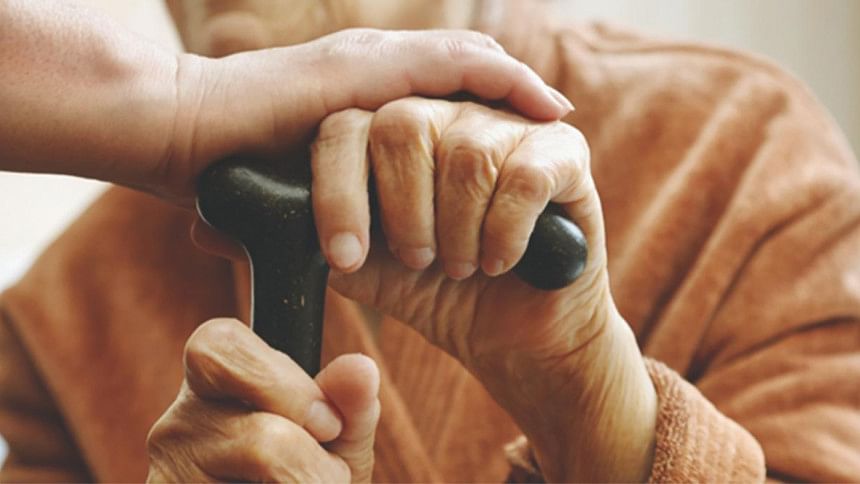Reimagining social protection for older people

Every year October 1 is observed worldwide as the International Day of Older Persons. The theme for this year's day is "The Journey to Age Equality", which calls attention to increasing old-age inequalities and seeks societal and structural changes in social protection and universal health coverage schemes for older persons around the world.
Globally, the proportion of people over the age of 60 is growing faster than all other age cohorts, with the developing world likely to experience rapid ageing in the coming decades. Bangladesh's population is also ageing: data from the UN's "2019 Revision of World Population Prospects" shows that the population of people aged over 60 years is projected to double, from 12.62 million (7.77 percent of the total population) in 2019 to 25.24 million (13.7 percent) in 2035. People of this age group are expected to more than triple in number in 2050, reaching around 42.1 million, which will account for 21.9 percent of the total population. That means by 2050, one out of five people will be over the age of 60. This trend in population ageing will continue throughout the century.
It's evident that demographic dynamics and age-structural transition of population will shape the key economic and developmental challenges in the foreseeable future. Moreover, the 2030 Global Agenda for Sustainable Development will remain unachievable if we fail to address the needs and challenges of people over 60. The increasing share of these people in the population estimate and the shortfalls of existing programmes meant for them also underscore the importance of a well-designed social protection system in Bangladesh.
When it comes to social insurance, only those who are in government service enjoy this benefit fully. People involved in the informal sector are deprived of any kind of public pension schemes. Even the private sector, with some exceptions, is far away from such social insurance that would ensure security for their employees during their old age. The government can make it obligatory for the private sector to introduce mandatory contributory insurance and savings plans for their employees allowing private organisations to provide pension to them. Furthermore, since most people in Bangladesh are engaged in the informal sector (85.10 percent of the employed), having little or no access to a social protection scheme for their old age, a universal social insurance system that would not depend on people's work situation is also required. The government can also consider introducing a non-contributory health insurance programme, especially for the poorest and most vulnerable of older people.
Social assistance—transferring cash to older persons in need—is another important means of protection. This year, the government is providing an old-age allowance of Tk 500 per month to more than 4.4 million people. Though the coverage of the allowance is wide, targeting the most vulnerable among older people still remains a challenge. The amount provided to each older person requires to be increased, while the mode of payment also needs to be reconsidered. Many of those living in the rural areas find it difficult to come to the upazila to receive the amount, spending their whole day in designated banks. Direct cash transfer through mobile banking or post office might be a better alternative to this. The necessity of such allowances will not fade away even if a universal social insurance programme is introduced. The government should undertake and regularly upgrade other progressively subsidised programmes to address the different needs of older people.
Apart from these, other social support systems meant for the older people need to be improved to ensure effective social protection for them. While working on the ageing issues of Bangladesh, the first challenge that one encounters is shortage of data. There is no official data regarding the challenges faced by the older population. Besides, there is also a lack of scientific research work on ageing online. Bangladesh Bureau of Statistics (BBS) can undertake a nation-wide survey highlighting the situation, challenges, needs, and also abuse and neglect faced by the elderly. A national foundation for the development of the elderly population is also required. To this end, the drafted Probin Unnoyon Foundation Act, 2017 should be put into effect before long.
The National Policy on Older Persons, 2013 should be implemented widely and all other plans and measures should reflect the points highlighted in the policy. The 8th Five Year Plan should address the ageing issue as a special priority of the government. Given the widespread prevalence of abuse and neglect facing the elderly in Bangladesh, people are not yet aware of the Parents' Care Act, 2013. Community legal aid services and Alternative Dispute Resolution (ADR) should be enhanced to ensure enforcement of the act and to protect our older population from abuse and neglect. The media can play the most important role in this regard.
In addition to social policies and legislation as a means of social protection for the older people, the Department of Social Services (DSS) should establish old homes in every district. The NGOs also need to come forward in this regard. Citizen's platforms and older people's networks at the community level can also be useful to ensure active ageing.
To sum up, a well-designed and efficiently managed social protection system for the older population is not only key to ensuring age equality, it can also offer our country the opportunity of a "second demographic dividend", turning the aged population into productive members of the society. It's high time we revisited our entire social protection system based on the issues discussed above for the sake of all of us.
Shekh Farid is Statistical Officer at Bangladesh Bureau of Statistics (BBS). He can be reached at [email protected]

 For all latest news, follow The Daily Star's Google News channel.
For all latest news, follow The Daily Star's Google News channel. 



Comments